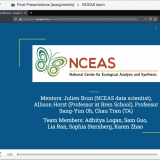Developing a data set for each of the 28 sites of the Long Term Ecological Research (LTER) Network

About the Project
Dr. Julien Brun (NCEAS) and Dr. Allison Horst (UCSB Bren School) have been developing an R package to help teach data science. The main goal of this package is to offer a set of data sets to replace the usual datasets shipped with R (mtcars, iris, …) with something more exciting and geared towards Environmental Sciences. We aim at developing a data set for each of the 28 sites of the Long Term Ecological Research (LTER) Network. Students on this team will help Julien and Allison with their R package (and accompanying website).

The LTER network is an NSF-funded research program to observe long-term and large scale ecological effects at various sites across the United States. LTER datasets are archived in a centralized data repository managed by the Environmental Data Initiative (EDI).
This project is based on a previous project led by Allison on the Palmer Penguins data set: https://allisonhorst.github.io/palmerpenguins/
Student Team
- Sam Guo
- Adhitya Logan
- Lia Ran
- Sophia Sternberg
- Karen Zhao
Mentors
- Julien Brun, Sponsor
- Allison Horst, Sponsor
- Chau Tran, TA
- Sang-Yun Oh, Faculty
Presentation
About NCEAS
National Center Ecological Analysis and Synthesis (NCEAS) conducts transformational science focused on informing solutions that will allow people and nature to thrive. NCEAS are an independent research affiliate of the University of California, Santa Barbara, with a global network and impact.
(from https://www.nceas.ucsb.edu/about): [NCEAS works] to accelerate scientific discoveries that will enhance our understanding of the world and benefit people and nature, as well as to transform the scientific culture to be more open, efficient, and collaborative.
We do this by:
-
Enabling collaborations between the brightest minds in the environmental sciences
-
Conducting breakthrough science that is grounded in big-picture thinking
-
Improving analyses through computing innovations that increase the (re)usability of data
-
Partnering with agencies and organizations that can help put the science to action
-
Training and inspiring generations of scientists to practice synthesis and open science
